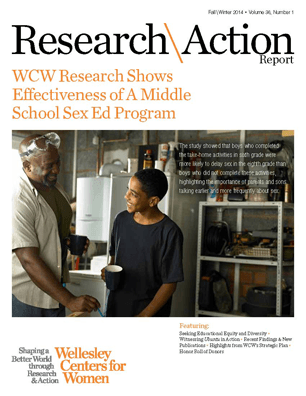Research & Action Report, Fall/Winter 2014
In late October, Planned Parenthood League of Massachusetts, the Wellesley Centers for Women, Planned Parenthood Federation of America, and ETR announced new findings published in the Journal of School Health that show Planned Parenthood’s middle-school curriculum, Get Real: Comprehensive Sex Education That Works, helps kids wait until they are older to have sex. It is particularly effective for boys.
“We are extremely proud the research shows our Get Real curriculum works,” said Jen Slonaker, vice president of Education and Training at Planned Parenthood League of Massachusetts. “Among students who received Get Real, 16 percent fewer boys and 15 percent fewer girls had sex compared to their peers who did not take Get Real.”
Get Real is a middle school program for sixth, seventh, and eighth graders that delivers accurate, age-appropriate information and emphasizes healthy relationship skills and family involvement over the course of 27 classroom lessons and corresponding take-home activities. To date, over 150 schools in Massachusetts, New York, Rhode Island, and Texas have selected Get Real. The curriculum’s strong emphasis on family involvement make the release of the findings timely, as October was “Let’s Talk Month,” a national effort aimed at encouraging parents and their children to talk with one another about sex, sexuality, and relationships.
“Over 90 percent of parents support having sex education in both middle and high school,” said Leslie Kantor, vice president of Education at Planned Parenthood Federation of America. “We also know parents can make a real difference in their teen’s lives by talking early and talking often about sex. The Get Real findings add to a growing body of evidence that family communication is critical to young people’s decision-making and health, and that it’s important that communication begins before a teen becomes sexually active and continues throughout adolescence.”
Sumru Erkut, Ph.D., senior research scientist, and Jennifer Grossman, Ph.D., research scientist, scholars at the Wellesley Centers for Women, led a research team in the design, data collection, and analysis for the multi-year evaluation that produced these results.
“We were selected to be the external evaluator in a competitive peer review process,” notes Erkut, co-principal investigator of the study. “The goal of the evaluation was to assess if the three-year curriculum was effective in delaying sex for middle school students. To figure this out, we conducted a study using a randomized control design, considered the Gold Standard for evaluation research.”
Get Real is one of only a few middle school programs that reduces risky sexual behavior for BOTH boys and girls. These findings are particularly impressive because Get Real was tested among young people at high risk for early sexual intercourse. For boys in particular, family involvement showed an added effect on delaying sex. Boys who completed the Get Real take-home activities in sixth grade were more likely to delay sex in the eighth grade than boys who did not complete these activities, highlighting the importance of parents and sons talking earlier and more frequently about sex.
“To understand this finding, we can look to research on how parents talk with their daughters and sons about sex—parents tend to talk earlier and more frequently with their daughters than their sons,” said Jennifer Grossman, Ph.D., co-principal investigator and lead author of the recently published paper describing the Get Real evaluation findings (Grossman, J. M., Tracy, A. J., Richer, A., & Erkut, S. (2014). The role of extended family in teen sexual health. Journal of Adolescent Research.). “It may be that the sixth grade family activities encouraged parents to begin discussing sexual issues with their sons earlier and more often than they would have otherwise, which could be the critical factor for delaying sex.”
“Our goal is to give students accurate information, help them to develop healthy communication skills, and promote family communication, all of the key ingredients needed to form healthy relationships, delay sex, and protect their own health,” Slonaker said. “The Get Real program is meeting that goal and we’re excited to bring it to more schools and communities around the country.”
Learn more about the research, link to the journal article, and listen to an audio archive from the press conference call by visiting www.wcwonline.org/getreal. Read Grossman’s related article on the Women Change Worlds blog: www.wcwonline.org/EasyBlog/let-s-talk-about-sex.


